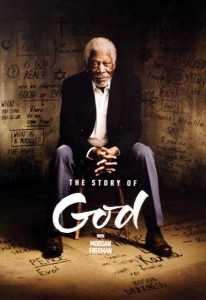Morgan Freeman’s The Story of God: An Exploration of Belief

“Today, for better or worse, the power of religion touches all our lives, no matter what our faith. This is Morgan Freeman’s journey to discover how our beliefs connect us all. This is the quest of our generation. This is the story of God.” (From the National Geographic Channel)
On March 21, I attended the premiere screening of the National Geographic Channel’s new series, The Story of God, narrated by legendary actor Morgan Freeman, at the Frederick P. Rose Hall of Jazz at Lincoln Center in New York City. The opportunity to see and hear Freeman himself (who played God in the films Bruce Almighty [2003] and Evan Almighty [2007]) was extraordinary, as was the reception overlooking Columbus Circle, replete with chandeliers, champagne, and celebrities. But I was disappointed by the episode “Beyond Death,” the first in a six-part series that explores ancient and modern faiths, as well as science, looking for commonalities.
One thing to bear in mind while watching this series is that it is essentially Freeman’s “personal journey,” a point emphasized in the resource material provided on the website. He declares himself a seeker—not necessarily a believer—who has always been fascinated by the origins and practices of the world’s religions. His interest is in how human beings, given the reality of their mortality, find and create meaning in their lives. This “meaning-making,” he believes, is what, in spite of our differences, connects us all. To this end, he takes us on a whirlwind tour around the globe to visit artifacts, observe rituals, and interview experts who include priests, rabbis, swamis, lamas, archeologists, and scientists.
National Geographic is well suited to the task; the sweeping vistas of deserts, mountain tops and rivers are worthy of an IMAX production and sometimes threaten to overshadow Freeman’s goal. Shot over the course of “forty days and forty nights” (said with a wink that elicited a knowing laugh from his audience), Freeman flew over 100,000 miles, visiting thirty cities in seven countries. For this first episode, he visited pyramids in Egypt and Guatemala, the Church of the Holy Sepulchre in Jerusalem (where Jesus’s tomb is purported to be), a library in the Vatican, and a spot on the Ganges River in India where Hindus believe they can be cremated and end the cycle of reincarnation. He also chats with a neuroscientist in Central Park and offers himself as a test subject in a scientific lab to examine how neuroscience intersects with religion.
A welcome and recurring theme of uncertainty is prevalent. Freeman approaches his subject and conducts his interviews with an intellectual humility. He wants to learn—and share what he learns with viewers. “In some places I found answers, and others led to more questions. The constant through it all is that we’re all looking to be part of something bigger than us. If there’s one thing I’ve learned, it’s that we certainly are.” The good news for humanist viewers is that he rarely makes pronouncements about belief or unbelief. Rather, he invites us to explore with him and enter into a conversation. The “something bigger” need not be God; it could be the universe.
What I found disappointing was the “big picture” aspect that generalized religious experience. Representative clergy talked about their religions in definitive terms: “This is what Christians, Jews, Muslims, Hindus, etc. believe and do”—with no appreciation for the differences within religions, the proliferation of often competing theologies, denominations, and sects. Perhaps that is too much to ask of a television show following someone on an idiosyncratic trek. Nonetheless, some mention of this could prevent viewers from making harmful generalizations.
I also felt uneasy about the interview with a former research diver who shares his near-death experience (NDE) story in a Christian cathedral. “I noticed this light,” he says. “It was millions upon millions of fragments of light, in all different colors, and they were all dancing and swirling, kind of like they were of one mind. And it was infinite. I knew I wasn’t in Kansas anymore.” Medical advancements have made it possible for more people to experience NDEs. Neurosurgeon Eben Alexander has built a new career selling his book and giving lectures proving that heaven exists. Although Freeman treats this subject subtly, the setting belies his intent.
I can recommend this series with this caveat: Enjoy the scenery, but beware its limitations. Morgan Freeman is an engaging narrator, interviewer, and storyteller. This project is clearly very personal. In the first episode, he travels to his birthplace in Mississippi and recalls the deaths of his grandmother and brother before he was eighteen years old. “Everybody grieves,” he says. “But some people have a certainty that helps them cope with grief—they are certain they will see their loved ones again in heaven. For some of us, it’s not quite that simple. In fact, it’s the greatest question we ask ourselves: What happens when we die?” Personally, I don’t believe that anything more happens than that our atoms are returned to the universe, that we once again become stardust. That is enough for me.
